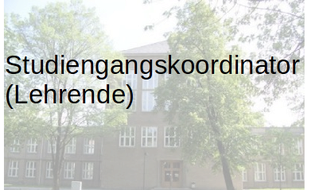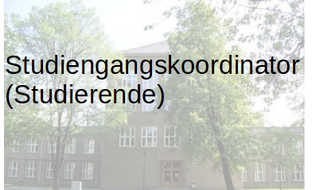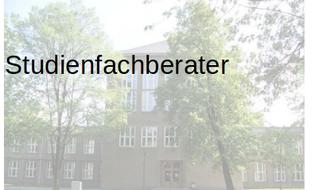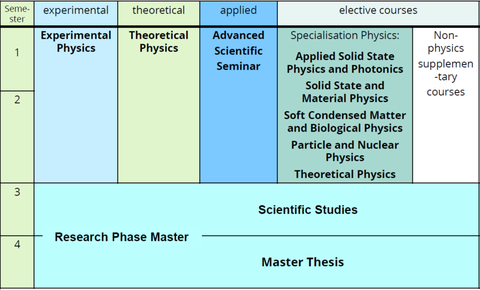Master's degree program in Physics
Table of contents
- Welcome to the Master's degree program in Physics!
- Goals, objectives and strengths of the Master's program
- Structure of the Master's program
- Primary language of instruction is English
- Examined assessments
- Admission requirements and other general requirements
- Physics landscape of Dresden
- Support, training and other offers
- Aptitude assessment, application, enrolment and formal study documents
- Starting your Master Studies
- Course coordinators
- Academic advisor
Welcome to the Master's degree program in Physics!
The international Master's degree program in physics is offered at the TU Dresden since Winter Semester 2012/13. The program is organised into modules and the standard period of study is 4 semesters. You may start the program in either the winter semester or the summer semester.
IMPORTANT NOTICE: Starting from the Winter Semester 2025/2026, all applicants must register for an aptitute assessment in parallel to applying for the Master's program.
Physics is about figuring out what nature makes possible; Dresden provides you with new possibilities in life. Come and join TU Dresden’s international Master’s program “Physics”. © Fakultät Physik, TU Dresden; Film: Biermann-Jung Kommunikation & Film
Goals, objectives and strengths of the Master's program
- The aim of the Master course is to gain insight into relationships between different areas of physics and into their connections to neighboring scientific disciplines.
- You will formulate, analyze and solve complex physical problems and tasks by combining your knowledge from different branches of physics.
- The study program offers 5 specialisation areas and a strong connection to physics research during a 1-year research phase including a Master thesis.
Structure of the Master's program
- The standard period of study is 4 semesters.
- The program starts in the Winter semester and in the Summer semester.
- 5 physics spezialisation areas
- Applied Solid State Physics and Photonics,
- Solid State and Material Physics
- Soft Condensed Matter and Biological Physics
- Particle and Nuclear Physics
- Theoretical Physics
- Two compulsory modules „Experimental Physics“ and „Theoretical Physics“ impart key concepts of physics: in lectures and tutorials you will connect different areas of physics, like atomic and molecular physics, solid state physics, and nuclear and particle physics, as well as concepts and methods of theoretical physics.
- Advanced scientific seminar on modern physics topics.
- Non-physics supplementary courses (non-physics minors) from 12 scientific domains: Mathematics, Biomathematics, Chemistry, Biology, Molecular Biology, Computer Science, Philosophy, Electrical Engineering, Mechanical Engineering, Materials Science, Economics, Business Administration
- Possibility to study abroad e.g. in the first summer semester
- 1 year research phase with Scientific Studies and Master's thesis: The module Scientific Studies is the introduction and preparation to the research project of the Master thesis. This module and the Master thesis deal with a common, overarching research topic.
Primary language of instruction is English
- The primary language of all physics seminars, lab courses, and physics lectures is English.
- Examinations in these courses can be taken in English or German.
- The language of the minor subjects is either English or German, including the respective exams, and is announced each semester in the catalogue of minors.
Examined assessments
- Modules Experimental Physics and Theoretical Physics: oral exams
- Advanced Scientific Seminar and Scientific Studies: scientific presentations
- Specialization Physics: oral exam and a collection of written assignments (e.g. lab protocols)
- Non-physics supplementary courses: different types of assessments, depending on the courses selected
- Written Master‘s thesis
Admission requirements and other general requirements
- University degree (e.g. Bachelor of Science) in Physics, or a degree in Physics at an officially recognized vocational academy, or a University degree or an academy degree in a closely related subject
- Knowledge of the fundamentals of Experimental Physics and Theoretical Physics and of the related mathematical methods equivalent to the content of the Bachelor’s degree in Physics at the TU Dresden, in particular a well-grounded knowledge
- of the fundamentals of Experimental Physics in the area of mechanics, heat and thermodynamics, electromagnetism, quantum physics, atomic and molecular physics, as wells as in the areas solid state physics or nuclear physics or particle physics or biological physics
- of the fundamentals of Theoretical Physics in the area of theoretical mechanics, theoretical electrodynamics, theoretical quantum mechanics, as well as statistical physics or theoretical thermodynamics
- physics laboratory training, including programming and
- mathematical training
- Proficiency in English at the B2 level of the Common European Framework of Reference for Languages, proven by
- a certificate of general or subject-specific university entrance qualification with a basic or advanced course in English (or comparable levels), or
- a certificate for admission to higher education completed in English or a higher education graduation certificate (e.g. a Bachelor’s degree) completed in English, or
- the score obtained in an internationally offered English test (e.g. IELTS: a score of at least 5.5 in each category, online TOEFL: 72 with at a score of 17 in each category, UNIcert II).
- Organizational skills, autonomy and motivation to pursue the multi-option Master’s study program in Physics at TU Dresden
Physics landscape of Dresden
- Research topics are an integral part of the Master’s study program
- 5 research institutes at the Department of Physics
- Many external physics research institutes, e.g. Institutes of the Max Planck Society and of the Leibnitz Society, Frauenhofer Institutes, and a Helmholtz Institute.
- Cross-disciplinary connections to other fields of science at TU Dresden, for example to computer science, electrical engineering, mechanical engineering, philosophy, as well as to central institutions like the High Performance Computing Center ZIH or the Center for Molecular and Cellular Bioengineering (CMCB) .
- Numerous options for internships, scientific studies and Master's thesis topics
Support, training and other offers
- Mentoring program of the Student Council of the Department of Physics
- Student Advisory Services at the Department and centrally at TU Dresden
- Study Success Program
- Language courses, writing courses, and other soft-skill courses,
- Career service
- University sport program
- and more
Aptitude assessment, application, enrolment and formal study documents
Please, visit the information page on the aptitude assessment, the application and the enrolment for the Master's program in Physics and the central Study Information System (SInS) the Physics Master's program. Formal information about the admission requirements, the study program, module descriptions, study plan, and assessment regulations can be found in the study documents.
IMPORTANT NOTICE: Starting from the Winter Semester 2025/2026, all applicants must register for an aptitute assessment in parallel to applying for the Master's program.
General information can also be found on the DAAD “International Programmes” portal on the Physics Master's Programme Dresden.
Starting your Master Studies
At the beginning of every winter and summer term, a Welcome and Information Event for the M.Sc. program in Physics and for all other study programs is organized by the Department of Physics.
Course coordinators
 © jb
© jb
Study Coordinator Physics Master (teaching personnel): Prof. Dr. Arno Straessner
Send encrypted email via the SecureMail portal (for TUD external users only).
Visiting address:
Andreas-Schubert-Bau (ASB), A 106
01062 Dresden
Postal address:
TUD Dresden University of Technology
Studiendekan Physik
Fakultät Physik
01062 Dresden
 © jb
© jb
Peter Maximilian Fischer
student course coordinator
Send encrypted email via the SecureMail portal (for TUD external users only).
Academic advisor
 © jb
© jb
Dr. Mathias Dörr
Visitor's address:
Recknagel-Bau
(ehemals Physikgebäude), D208
None
Office hours:
- Thursday:
- 14:00 - 16:00

